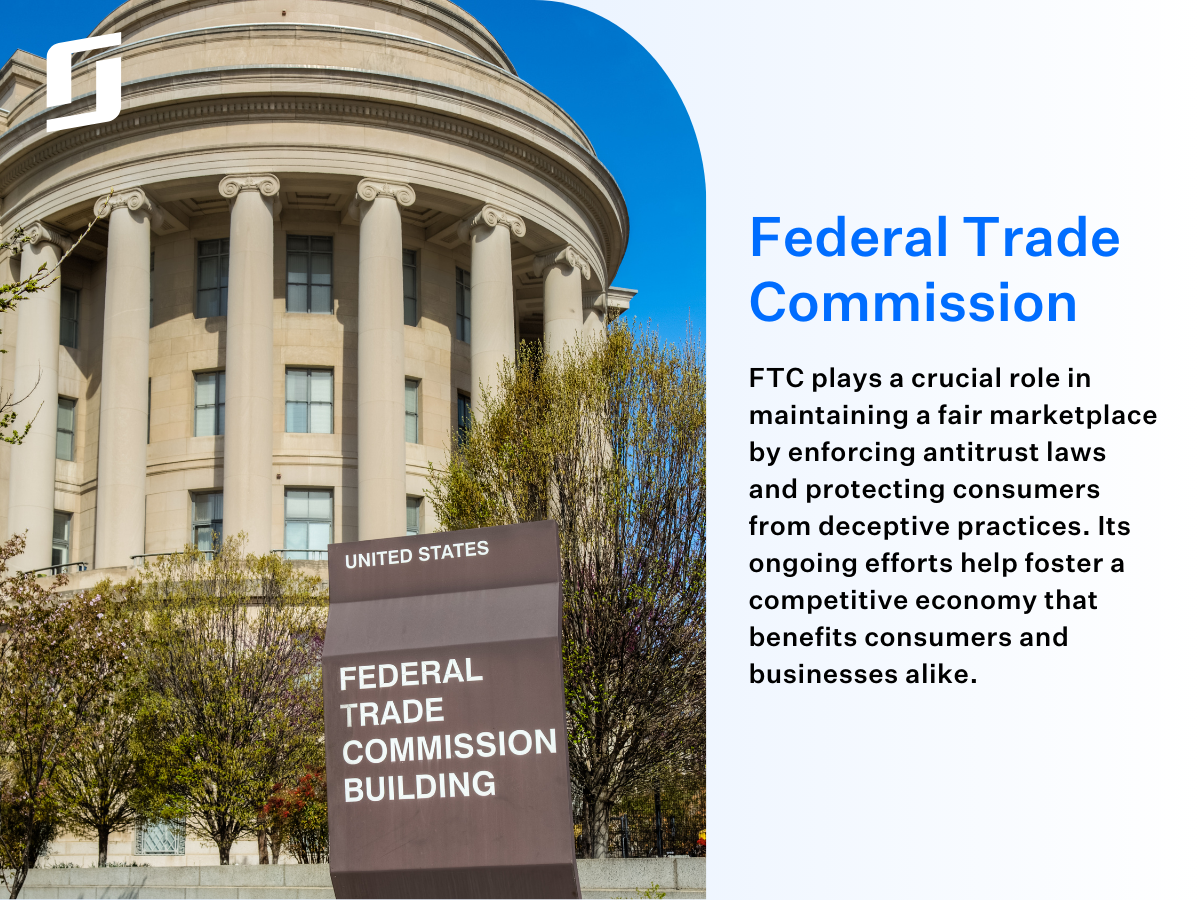What is the Federal Trade Commission?
The Federal Trade Commission is an independent agency of the US government that works to ensure economic competition between businesses and protect consumers from unjust practices. Also known as the FTC, the agency is headquartered in Washington, DC and is led by five commissioners, who generally serve seven year terms, decided upon by the president and confirmed by the senate.
The Federal Trade Commission’s history dates back to 1914 when it was initially established by the Federal Trade Commission Act.
What does the Federal Trade Commission do?
The Federal Trade Commission monitors and enforces antitrust laws and consumer protection laws. This covers issues such as false advertising, scams, fraud, identity theft, debt collection, privacy protection, and more.
When violations are found, the FTC has the power to file lawsuits, hand down cease and desist orders, and hand out fines.
For example, the FTC might make sure that hotels are not creating any false messaging or promising in their marketing – regarding amenities, services, or pricing.
What is the Federal Trade Commission Act?
The Federal Trade Commission Act is the formal law which helped establish the Federal Trade Commission. It outlines the powers and responsibilities of the FTC. Primarily its purpose was to prevent unfair or deceptive acts and practices when it comes to competing as a business or providing services to consumers.
This blog will give you a full overview of how the Federal Trade Commission plays a role in how hoteliers in the USA manage their business. Table of contents
Why is it important that the Federal Trade Commission serves its purpose?
The Federal Trade Commission’s purpose is an important one in the grand scheme of consumer legislation and protection. Not only does it work to prevent negative practices by businesses, but it also helps consumers detect, stop, and avoid these negative practices.
With the FTC doing its job and making businesses accountable for their actions, consumers can approach various markets with more trust and safety, ultimately benefitting the genuine businesses who are doing the right thing.
Here’s an overview of why the FTC is so vital:
- Fraud and scam prevention to protect people financially and avoid emotional distress.
- Ensuring truthful advertising to give consumers an accurate account of what a business is and what it does.
- Maintaining privacy such as protecting personal information and data.
- Preventing anti-competitive practices such as manipulating prices or creating unfair monopolies to create a level playing field.
- Building consumer trust to encourage economic stimulation.
- Encouraging innovation by incentivising companies to develop new and better products and services.
- Protecting vulnerable populations such as the elderly, children, and low-income individuals, who may be more susceptible to deceptive practices.
Keep all aspects of your hotel running smoothly Boost your hotel's efficiency and revenue while also keeping your data and security tight.
Federal Trade Commission facts
If rules and regulations seem like dry topics to discuss, it gets more interesting when we look at some of the facts about this key government agency.
Here are five Federal Trade Commission facts that make it stand out:
- It’s the only federal agency that oversees both consumer protection and business competition jurisdiction.
- The FTC also manages the National Do Not Call Registry in America.
- The agency now has more than 100 years of history protecting consumers.
- The FTC employs economists to analyse market trends, to inform it of the impact of regulations.
- It deals in both large and small scale cases, also helping on the consumer level to give people the tools to detect and prevent scams and fraud.
However, the most interesting thing about the FTC is how it might impact your hotel. Let’s discuss that in the next section.

FTC and hotel junk fees
Perhaps the biggest example of how the Federal Trade Commission impacts hotels is the recent news that the FTC has banned hidden junk fees from hotels and event tickets.
Junk fees, or hidden fees, are fees that are mandatory but not necessarily advertised upfront. For example, this can apply when consumers are purchasing tickets for a live event – or when booking a hotel.
The advertised price will be one amount, but the amount the guest is required to pay changes later when a hidden charge, such as a cleaning fee or booking fee, is applied to the account.
Under the ruling by the FTC, businesses will be required to accurately, clearly and conspicuously display all mandatory fees associated with the product or service being offered.
There are four specific prohibitions under the ruling, and businesses will be punished for:
- Failing to disclose “clearly and conspicuously” the “true total price inclusive of all mandatory fees” charged whenever a business “offer(s), display(s), or advertise(s) any price.”
- Failing to display the total price “more prominently” than “most other pricing information.”
- Misstating the cost or fees for any live-event tickets or short-term lodging.
- Misstating the identity of any good or service offered.
It should be noted that the ruling is purely a stipulation that businesses must disclose their fees and how they are displayed – it does not control which fees are charged or the amount of the fees that the guest or customer is required to pay.
Ultimately, it is about ensuring consumers have everything they need to make an informed decision to purchase – or not purchase.
List of hidden hotel fees
While not all may be applicable to the FTC’s recent ruling, there are a number of hidden fees that hotels sometimes use – which guests don’t take kindly to.
Here are some to keep in mind when listing your prices and terms and conditions:
- Resort fees: Resorts will often charge fees for all their various amenities and services – but guests have sometimes found that these charges are applied even for amenities they didn’t use during their stay.
- Check-in fees: Guests will often be charged extra for early check-in or late check-out, but it’s important to let them know this will be the case when they make their reservation or when they request the service.
- Additional occupancy charge: Guests who bring additional adults to stay in their room will be charged an additional person fee by many hotels.
- Wi-Fi: This is one of the biggest annoyances for guests. They simply do not want to be charged for Wi-Fi and don’t expect to be, however some hotels will still do so.
- Mini-bar and snack bar: Most guests know that these items will incur a charge, but some guests have been outraged to find they were charged a fee even without consuming anything. This is because some fridges contain sensors that detect movement and assume an item has been consumed if it is picked up.
- Parking fees: Again, most guests would expect to pay for parking but it’s important to let them know up front that this will happen and how much it will cost.
- Gym fees: This probably falls into the category of resort fees. If a guest does not use the gym equipment, it doesn’t seem fair to them to be charged for its upkeep and maintenance.
- Housekeeping: Sometimes there will be a housekeeping fee that guests are unaware of, meaning if they leave their housekeeper a tip they will be effectively paying twice.
- Mail fees: Guests staying for an extended time may get mail delivered to their hotel, and some properties have been known to charge guests for accepting this mail to the premises.
Other Federal Trade Commission examples for hotels
If properties fall foul of this new ruling, it won’t be the first time that the FTC has caught hotels undertaking incorrect practices.
Here are a few other examples of the FTC taking action:
Data security
The FTC has historically filed suits against both Marriott and Wyndham for failing to implement reasonable data security and failing to adequately safeguard computer networks respectively.
Fake reviews
The FTC has specific guidelines covering online reviews, and hotels must be careful. Fake reviews are an obvious bad practice but so is incentivising positive reviews without disclosing what the incentive is.
Accessibility
The FTC also considers accessibility as part of its broad mandate, though these regulations are often enforced under the Americans with Disabilities Act.
FTC enforcement and how to manage it at your hotel
FTC enforcement can result in lawsuits being brought against your hotel if they find that you have violated their rulings. This can result in large fines and loss of reputation – ultimately harming your business long term.
To ensure you’re on the right side of the legislation and providing an exceptional guest experience, make sure that you:
- Understand the focus areas of the FTC: These boil down to being truthful in your advertising, providing adequate data security for your guests, undertaking fair pricing practices, and being accessible to all.
- Be proactive: Don’t wait for the FTC to come knocking or for a guest to give you poor feedback. Try to make sure you have internal processes to ensure you are complying with the FTC’s known guidelines.
- Stay informed: Keep yourself across the FTC’s announcements and news outlets to ensure you don’t miss any new rulings that will affect you.
- Cooperate fully: If the FTC does get in contact with you, make sure you work with them in addition to seeking legal counsel and conducting your own internal investigations.
While this all might seem complicated, there are some easy ways to manage pricing, fees, and guest communications at your hotel…

